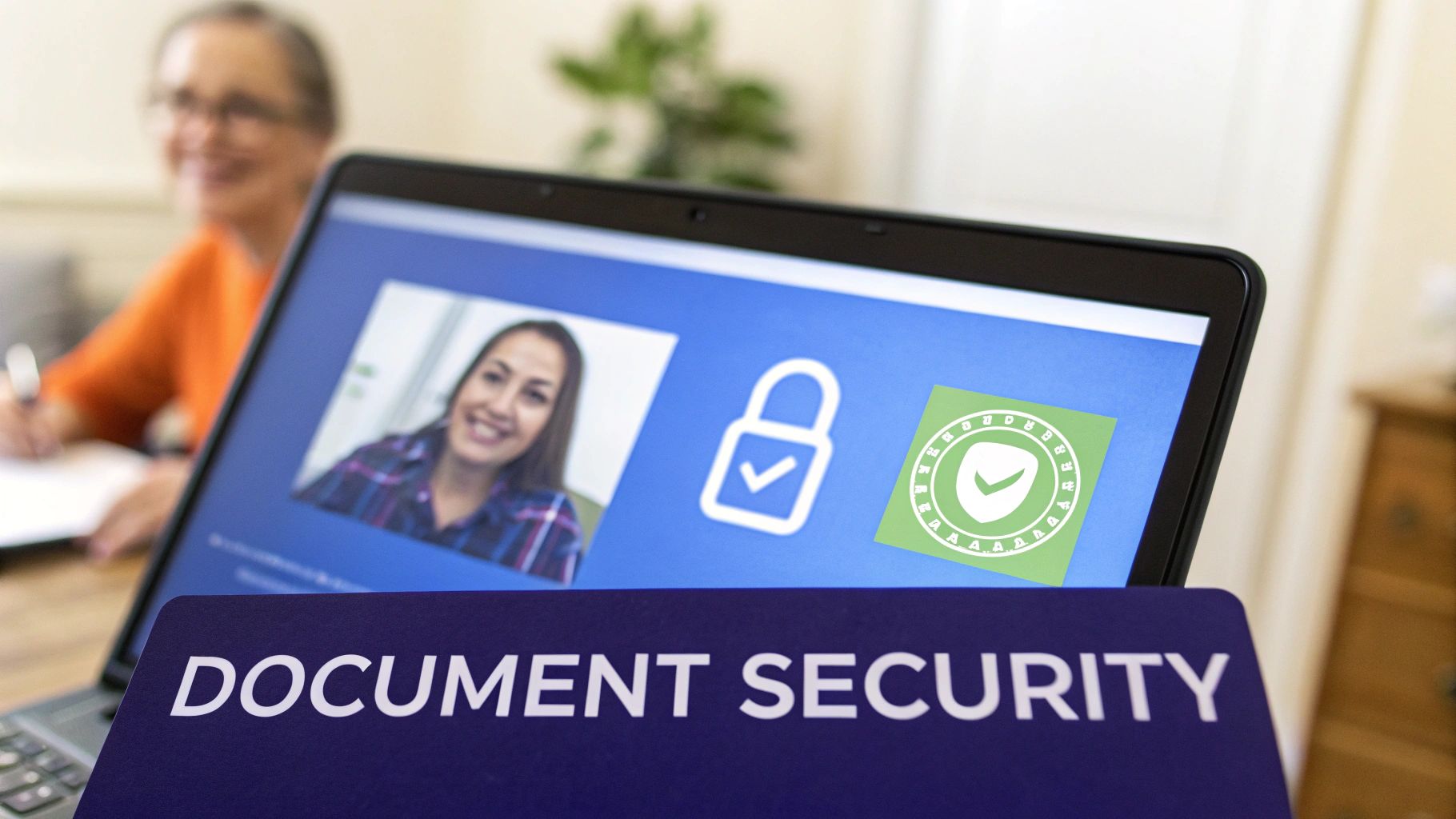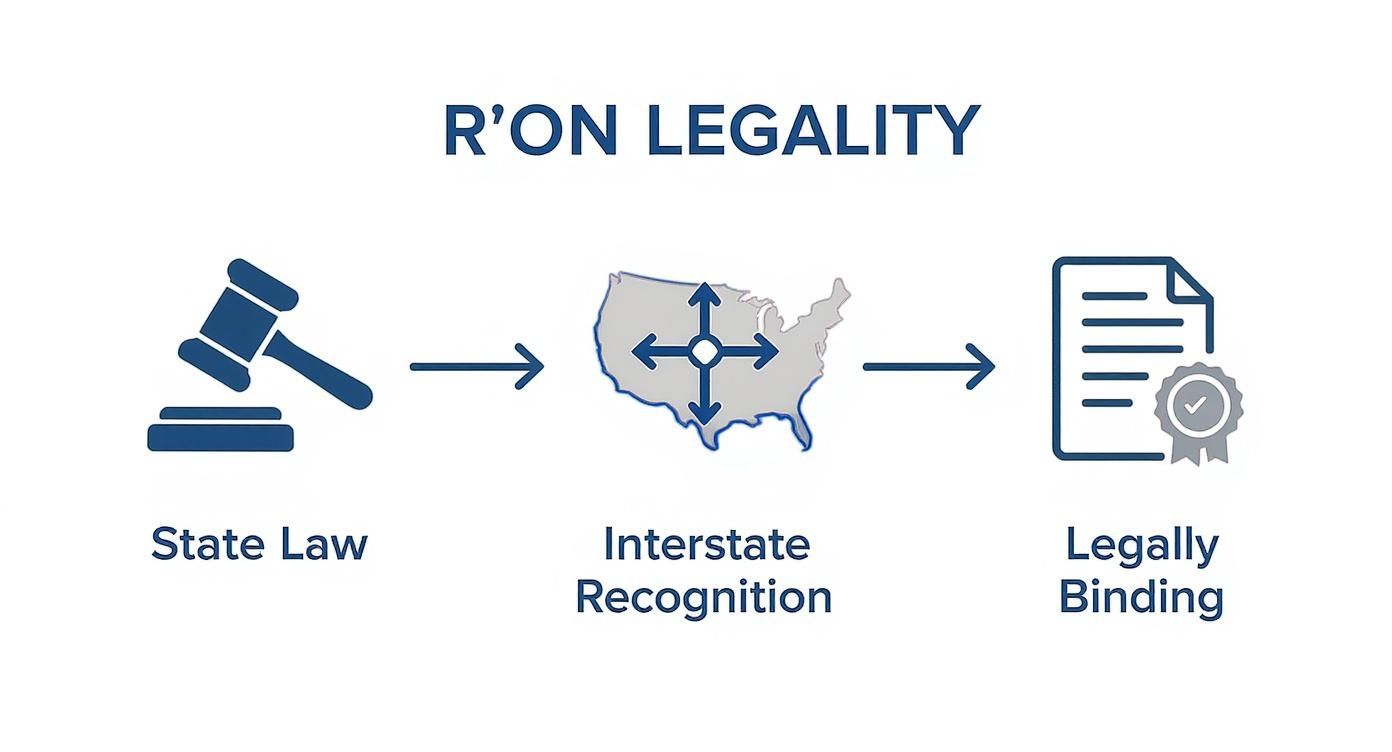A remote online notary lets you legally notarize your documents from pretty much anywhere, using just your computer or smartphone. Instead of the old routine of finding and meeting a notary in person, you just hop on a secure, live video call. It's a way to verify your identity and sign documents electronically, making the whole thing faster, more secure, and way more convenient.
What Is a Remote Online Notary?

Picture this: you need to get a critical document notarized for a real estate closing or a legal affidavit, but you don't have to leave your home office to do it. That's exactly what a remote online notary makes possible. It’s not some new type of notarization—it’s just a modern, tech-savvy way of performing the same traditional service. The physical table is replaced by a secure digital platform, and the face-to-face meeting becomes a live audio-visual session.
This digital approach has really taken off. Remote Online Notarization (RON) saw explosive growth after the big push for remote-everything back in 2020. By 2025, over 45 U.S. states had already passed laws to either legalize or expand its use, which shows just how widely accepted it has become. For perspective, major players like Notarize were already handling over 3 million notarizations annually by then, cementing RON's spot in modern business. You can dig into more data on the online notary service market to see its growth firsthand.
The Core Components of a RON Session
So, how does it all come together? A remote online notarization session boils down to three key steps that make sure the process is both secure and legally binding. These pieces work together to create a transaction that's often even more secure than a traditional, in-person signing.
- Document Upload: It all starts when you upload a digital version of your document (like a PDF) to a secure online platform.
- Identity Verification: The system uses a multi-layered process to confirm you are who you say you are. This usually involves credential analysis, where software scans your government-issued ID, and knowledge-based authentication (KBA), which asks personal questions that only you should know the answers to.
- Live Notary Meeting: You then connect with a state-commissioned remote online notary over a live, two-way video call. They watch you electronically sign the document and then apply their own digital signature and electronic seal.
At its heart, RON is about maintaining the integrity of the notarial act while completely removing geographical barriers. The technology ensures every step—from identity proofing to the final signature—is recorded and verifiable.
How RON Differs from Traditional Notarization
To get a clearer picture of how RON stacks up against the old-school method, let's break down the key differences side-by-side.
Traditional Notary vs Remote Online Notary
| Feature | Traditional Notarization | Remote Online Notary (RON) |
|---|---|---|
| Location | Must meet in person at a specific physical location. | Can be done from anywhere with an internet connection. |
| Scheduling | Requires coordinating schedules and travel time. | On-demand or scheduled instantly, often 24/7. |
| Speed | Can take hours or days, depending on availability. | Typically completed in under 15 minutes. |
| Identity Check | Visual inspection of a physical ID. | Multi-factor authentication (ID scan, KBA, biometrics). |
| Record Keeping | Manual entries in a physical paper journal. | Automatic, detailed digital audit trail and video recording. |
| Security | Susceptible to human error, ID fraud, and lost journals. | Tamper-evident seals and encrypted, unalterable records. |
The most obvious difference, of course, is that you don't have to be in the same room. But the real advantages run much deeper, especially when it comes to security and record-keeping. While a traditional notary relies on a physical journal that can be lost, damaged, or altered, a remote online notary platform creates a comprehensive digital audit trail.
This trail logs every single action taken during the session, from the moment you upload the document to the final click that applies the tamper-evident digital seal. The entire audio-visual session is also recorded and securely stored, providing undeniable proof of the transaction. This robust, unchangeable record offers a level of security and verifiability that paper-based methods simply can't compete with.
The Real-World Benefits of Digital Notarization
Sure, the most obvious upside of using a remote online notary is convenience, but the real value runs much deeper. For both people and businesses, making the switch from in-person to digital notarization turns clunky, time-sucking workflows into refreshingly simple ones. It's the difference between blocking off a week to get a document signed and getting it done in under 15 minutes from your desk.
This speed is a game-changer. Document turnarounds that used to take days—once you factored in travel, printing, mailing, and juggling schedules—are now cut down to mere minutes. This directly translates into real cost savings. Forget about paying for couriers, postage, printing, and gas. A real estate agent, for instance, can close a deal with an out-of-state buyer almost instantly, dodging expensive delays and giving their client a much better experience.
Enhanced Security and Trust
Beyond the speed and savings, a remote online notary brings a far more robust security model to the table. Traditional notarization leans on a quick glance at a physical ID and a paper journal, both of which are susceptible to sophisticated fraud and simple human error. Digital notarization, on the other hand, is a fortress.
It’s built on a multi-layered defense system:
- Advanced Identity Verification: Before a session even starts, the signer’s identity is locked down through tough methods like credential analysis of a government-issued ID and knowledge-based authentication questions only they should know.
- Comprehensive Audit Trails: Every single action—from the moment a document is uploaded to the final digital signature—is meticulously logged in a secure, unchangeable audit trail.
- Tamper-Evident Seals: Once notarized, the document gets a cryptographic seal. This digital safeguard makes it instantly obvious if anyone has tried to alter the document, protecting its integrity way more effectively than a rubber ink stamp ever could.
The combination of a detailed digital record and a video recording of the entire session creates a more verifiable and fraud-resistant transaction than paper-and-ink methods could ever provide.
Measurable Efficiency Gains
For businesses, these perks deliver a tangible return on investment. Legal teams can execute urgent affidavits or power of attorney documents without forcing clients to travel, which is a massive advantage in time-sensitive cases. Having immediate access to a remote online notary vaporizes geographic barriers and keeps legal processes moving without a hitch.
This efficiency isn't just about one-off transactions; it's about overhauling entire workflows. By its very nature, digital notarization streamlines a process that has always been manual and tedious, unlocking huge time savings. If you're interested in the broader principles of automating repetitive tasks to boost efficiency across your business, you might find that article insightful. By embracing digital tools, companies can shift resources away from administrative headaches and back toward core business goals.
Ultimately, the benefits feed into each other. Faster turnarounds lead to lower operational costs, better security builds more trust with clients, and the sheer convenience boosts customer satisfaction. This powerful combination gives businesses a clear competitive edge, allowing them to operate with more agility and confidence in any transaction that requires a notary's seal.
How RON Technology Ensures Your Documents Are Secure

When you use a remote online notary, you're not just picking the convenient option; you're choosing a process built from the ground up with security in mind. Think of it like a digital bank vault. It isn’t just one lock on the door. It's a whole system of advanced identity checks, live human oversight, and records that can't be changed, all working together to protect your documents.
This framework is deliberately designed to be stronger and more reliable than many traditional in-person methods. It plugs the common security gaps, creating a trusted environment where integrity is baked right into the technology. Let's pull back the curtain and see exactly how it works.
Confirming Your Identity Beyond Doubt
The first line of defense in any RON session is simple: proving you are who you say you are. RON platforms handle this with a slick, multi-step verification that goes way beyond a quick glance at an ID card.
This process usually has two key stages:
- Credential Analysis: You’ll start by snapping a picture of your government-issued ID, like a driver's license or passport. Sophisticated software then scans the ID's security features, holograms, and even the microprint to spot any signs of forgery.
- Knowledge-Based Authentication (KBA): After your ID checks out, you'll get a series of personal questions pulled from public and private data records. These are questions only you should know the answers to, like old addresses or associated phone numbers, adding a solid second layer of confirmation.
Only after you clear both of these hurdles can you move forward. This tough, automated screening is built to catch fake documents and identity theft attempts before a human notary even joins the session.
The Power of Live Video and Biometrics
That live, face-to-face video session is more than just a formality—it's a critical security feature. The notary acts as an impartial witness, visually matching you to the ID you provided. More importantly, they can gauge your demeanor and make sure you're signing willingly, without anyone pressuring you off-camera. You can learn more about how biometrics enhance online notary security in our detailed guide.
A remote online notary session combines the certainty of technology with the vital judgment of a commissioned human notary. The live interaction is a powerful deterrent against fraud, ensuring genuine intent behind every signature.
The addition of AI tech like facial recognition has only made this process stronger. The switch to secure digital processes has a huge business impact, too. The use of e-signatures has reportedly led to an 87% increase in employee communication and an 89% reduction in project length. This shows just how much faster and more reliable transactions can be.
Ensuring Document Integrity After Signing
Security doesn’t end when the call does. Every document notarized online is protected by powerful digital safeguards that guarantee its integrity for the long haul.
Here’s how your document gets locked down:
- Tamper-Evident Digital Seal: Once the notarization is complete, a cryptographic seal is applied. This seal is like an invisible tripwire. If anyone tries to alter the document in any way—even changing a single comma—the seal breaks, instantly showing the document has been tampered with and invalidating the notarization.
- Comprehensive Audit Trail: The platform automatically creates a detailed log of the entire session. This audit trail captures everything: the ID verification results, the exact time of each signature, and the IP addresses used. This electronic journal, paired with the video recording, creates a permanent, irrefutable record of the notarial act that's far more detailed than any old paper logbook.
This meticulous process is why leading platforms stick to strict compliance standards like SOC 2 Type 2 and MISMO. These certifications prove their systems are constantly audited for security and confidentiality, giving you peace of mind that the entire process is built for legal integrity.
Is Remote Online Notarization Legally Binding?
It’s the first question on everyone's mind: does a remote online notarization actually hold up in court? The answer is a clear and simple yes. A document notarized on a secure RON platform is just as legally binding as one stamped with ink in a traditional, face-to-face meeting.
This isn’t some legal gray area or a temporary workaround. The legitimacy of RON is built on a solid foundation of state and federal laws created specifically to govern electronic transactions. It’s a modern solution designed for today’s legal and business realities.
The Legal Framework Supporting RON
The widespread acceptance of remote online notarization comes from a combination of state and federal legislation working together. Individual states have passed specific laws that empower their commissioned notaries to perform their duties using secure audio-visual technology. As of 2024, the vast majority of U.S. states have enacted permanent RON laws, which shows a strong, nationwide trust in its security and effectiveness.
These state-level rules are supported by two landmark federal acts:
- The Electronic Signatures in Global and National Commerce (ESIGN) Act (2000): This is the big one. This federal law gave electronic signatures the same legal standing as their handwritten "wet ink" counterparts.
- The Uniform Electronic Transactions Act (UETA): Adopted by nearly every state, UETA created a standardized legal framework for using electronic records and signatures in business transactions.
Together, these laws ensure that a remotely notarized document is a valid and enforceable legal instrument. A good way to grasp the broader concept is to look at how other digital agreements are structured to be binding, like the legal terms for online services.
Understanding Interstate Recognition
"Okay, but what if my document is notarized by a notary in Florida, and I need to use it in California?" This is a common question, and the answer lies in a foundational principle of U.S. law: interstate recognition. This idea is rooted in the Full Faith and Credit Clause of the Constitution.
In simple terms, interstate recognition means a lawful notarial act performed in one state must be legally recognized in all other states. So, if a document is properly notarized by a commissioned remote notary in Virginia, it's just as valid in New York, Texas, or anywhere else in the country.
This principle is what makes modern commerce possible, allowing transactions to flow smoothly between parties in different states. For a deeper look at this, check out our guide on how states recognize notarizations from one another. The main thing to remember is that the signer's location doesn't matter—what's critical is that the notary follows the laws of the state where they are commissioned.
How RON Is Different From Other Electronic Methods
It's also important to know that not all "electronic" notarizations are created equal. True RON is distinct from other digital methods, and these differences are why it’s considered so secure and is widely accepted.
To help clarify the landscape, here's a quick overview of how states have approached RON legislation.
State-by-State RON Legislation Status
An overview of how different U.S. states approach Remote Online Notarization, categorized by their current legal status to help users understand broad acceptance.
| Legal Status | Description | Example States |
|---|---|---|
| Permanent RON Laws | These states have passed specific legislation permanently authorizing remote online notarization with detailed security and identity verification requirements. | Florida, Texas, Virginia, Nevada |
| Temporary Measures | Some states adopted temporary emergency orders during the pandemic, which may or may not have been made permanent. | Varies, as laws continue to evolve. |
| No RON Laws | A very small number of states have not yet passed specific RON legislation, though they typically still recognize out-of-state RONs. | Check current state regulations for specifics. |
It's clear that the trend is overwhelmingly in favor of permanent, well-regulated RON frameworks.
RON is fundamentally different from In-Person Electronic Notarization (IPEN), where you still have to be physically present with the notary to sign on a tablet or computer. It also isn't the same as Remote Ink-Signed Notarization (RIN), which is a clunky process of signing a paper document on camera and then mailing it to the notary.
RON is the only method where the entire process—identity proofing, signing, and sealing—occurs in a single, secure digital session. This creates a comprehensive, legally defensible record that the other methods just can't match.
Your Step-By-Step Guide to Using a RON Service
Getting your first remote online notarization done is way easier than you might think. Don't picture a stuffy, complicated legal process. It’s more like hopping on a secure video call that's been specifically designed for signing documents. The whole thing is built to be simple and quick, turning what used to be a pain of an errand into a 10-minute task you can knock out from literally anywhere.
This guide will walk you through the process from the perspective of a signer, which is how most people first encounter a remote online notary service. We'll break down every part of the journey, from getting your documents ready to downloading the final, legally notarized file. No surprises.
Preparing for Your Session
Before you even see the notary's face on screen, a few quick preparations will make your session a breeze. Think of it like getting your ingredients together before you start cooking—it just makes everything go faster and smoother. The good news is, you don't need any special tech, just the stuff you probably use every day.
For most modern RON platforms, including BlueNotary, you just need three basic things:
- A stable internet connection: This is key for a clear, crisp video call with the notary. No one likes a frozen screen.
- A device with a camera and microphone: Your laptop, tablet, or smartphone will work perfectly.
- A valid government-issued photo ID: This could be your driver's license, state ID card, or passport. Just make sure it isn't expired!
Once you have those ready, you'll upload the document that needs notarizing right onto the platform. It's as simple as attaching a file to an email. From there, the system holds your hand and guides you to the next step: connecting with a live, commissioned notary public.
The Live Notarization Process Unpacked
With your document uploaded and ID in hand, you're ready for the main event. The live session with a remote online notary is where the magic really happens, blending high-tech security with the critical judgment of a human professional. This part of the process usually wraps up in less than 15 minutes.
This visual flow shows how state law and interstate recognition work together to make your remotely notarized document legally binding.

This process ensures that a document legally notarized online in a state with RON laws is recognized and accepted across the country.
The live session moves through a few distinct stages:
- Identity Verification: First things first, the system has to confirm you are who you say you are. It will automatically scan your photo ID and might ask you a few quick security questions based on your public record (this is called knowledge-based authentication).
- Connecting with the Notary: You'll pop into a secure, recorded audio-visual session with a live remote online notary. They'll greet you and double-check your identity visually, comparing you to the photo on your ID.
- Reviewing and Signing: The notary will make sure you understand the document you're signing and are doing it willingly. Then, they'll point you to where you need to apply your electronic signature.
- Notary's Seal and Signature: Once you've signed, the notary does their part. They'll affix their own digital signature and electronic seal to the document, which officially completes the notarization.
The entire experience is designed to be interactive and guided. The remote online notary is there to walk you through each step, so you never have to guess what to do next. Their role is to ensure the process is followed correctly and securely.
After the Session Ends
Once the video call is over, you can relax—your job is done. The platform then works its final magic by applying a tamper-evident seal to the digital document. This is a powerful cryptographic feature that locks down the document's integrity. If anyone tries to alter it after the fact, it will be immediately obvious.
You can then instantly download your completed, legally notarized document. No waiting for the mail to arrive or driving somewhere for a pickup. The file is securely stored and ready when you need it, complete with a full audit trail and a video recording of the session, creating a rock-solid, verifiable record of the whole event.
Where Remote Notarization is Making Waves
You can talk theory all day, but the real magic of a remote online notary happens when you see it in action. While pretty much everyone benefits from the convenience, a few key industries have completely overhauled their workflows by adopting RON. They're solving age-old headaches of distance, speed, and security.
Think about it: from closing million-dollar real estate deals to signing sensitive legal papers, RON is delivering real, measurable results.
This isn't just a niche trend; it's a response to a huge demand for more flexible ways to get things done. The global online notary market is booming, especially in North America. The U.S. mobile notary public market alone was valued at around $0.5 billion in 2025 and is expected to grow at a blistering 18.4% CAGR through 2035. That's a clear signal that on-demand services are no longer a "nice-to-have" in major sectors. You can find more data on the growth of the online notary market on archivemarketresearch.com.
Let's look at where this is having the biggest impact.
Real Estate and Title Closings
For anyone in real estate, RON is nothing short of a game-changer. We've all been there—the traditional closing is a logistical nightmare. You're trying to get buyers, sellers, and agents all in the same room, at the same time, to sign a literal mountain of paperwork. A remote online notary just wipes that entire problem off the board.
Suddenly, an out-of-state buyer can close on their dream home from their couch. A title company can wrap up dozens of closings in a day without juggling a single physical appointment. This doesn't just cut down transaction times from weeks to hours; it completely transforms the client experience. For a deeper look, check out how BlueNotary supports title and real estate closings with specialized tools.
By taking geography out of the equation, RON lets real estate deals move at a speed that was unthinkable a few years ago. This means faster funding, lower overhead, and happier clients all around.
Legal Services and Document Execution
In the legal world, the clock is always ticking. Lawyers are constantly up against deadlines to get critical documents like affidavits, wills, trusts, and powers of attorney signed and executed. Trying to get a client who is sick, traveling, or just lives far away to come into the office can cause major—and costly—delays.
A remote online notary offers a secure, legally recognized solution. A law firm can have a client in another state sign a sworn affidavit in minutes, ensuring they never miss a court deadline. It's become an essential tool for:
- Estate Planning: Finalizing wills and trusts for clients without making them travel.
- Litigation: Getting notarized witness statements and affidavits on the fly.
- Corporate Law: Executing board resolutions and other official documents without scheduling conflicts.
Financial Services and Lending
Banks, credit unions, and lenders depend on notarized documents to secure loans, open accounts, and verify identities. The old-school process is a huge point of friction, slowing everything down from client onboarding to loan disbursement.
With RON, a lender can securely notarize loan documents for a borrower anywhere in the country. This pushes the funding process forward much faster while keeping everything compliant. It cleans up internal workflows and delivers the kind of modern, seamless experience that customers have come to expect.
Still Have Questions About Remote Notarization?
Even after you get the basic idea, it’s normal to have a few practical questions pop up before you jump into your first online notarization. Let's run through a final checklist to tackle those last-minute uncertainties and get you ready to go.
We've pulled together the most common things people ask right before they start. The goal is to clear up the small details so you can move forward with confidence, knowing exactly what to expect.
What Do I Actually Need for My Session?
One of the biggest myths about remote online notarization is that you need some kind of special, expensive tech. The reality is way simpler. In fact, you probably have everything you need on your desk right now.
Here’s the short and sweet list of what's required:
- A decent internet connection so your video call doesn't drop.
- A device with a camera and microphone, like a laptop, desktop PC, tablet, or smartphone.
- A valid, government-issued photo ID that isn't expired. A driver's license, state ID, or passport works perfectly.
That's it. No complicated software to install or fancy hardware to buy. Modern platforms like BlueNotary are built to be accessible, running straight from your web browser.
If you can handle a Zoom or FaceTime call, you've got all the technical skills you need. The whole point is to make this easy.
How Long Is This Going to Take?
Another question we get all the time is about the time commitment. We've all been there with traditional notarizations—driving somewhere, waiting in line, and watching the clock tick. It can be a total time sink.
A remote online notary session, on the other hand, is incredibly fast.
While the exact time can shift a bit depending on how complex your document is or how many people are signing, most sessions are wrapped up in just 10 to 15 minutes. That includes the identity check, the face-to-face meeting with the notary, and getting all the digital signatures and seals in place.
Is a Remote Notarization as Legitimate as an In-Person One?
Absolutely. This is probably the most important question of all, and the answer is a firm "yes." A document notarized on a compliant remote online platform is legally the same as one you get stamped in person.
This isn't just a gimmick; it's backed by solid legal frameworks. State-specific RON laws and the legal principle of interstate recognition mean that a notarization done legally in one state is accepted in all the others.
What if your document is for international use? While RON is a standard in the U.S., documents heading overseas might need an extra certification called an "apostille." You should always check the rules of the destination country, but getting the remote notarization done is the critical first step.
Ready to see for yourself how simple and secure remote online notarization can be? BlueNotary transforms annoying paperwork into a quick, 10-minute online meeting. Get your documents notarized 24/7, from anywhere on the globe. Start your secure notarization now at BlueNotary.








